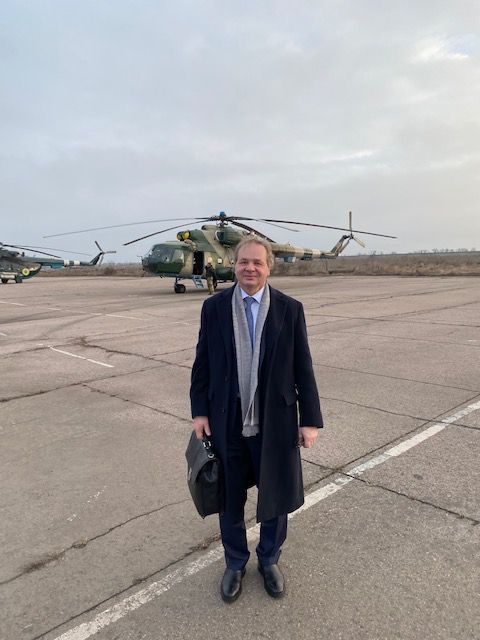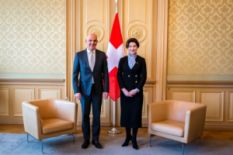Over the years of diplomatic work, Ukraine has truly become a home country for Mr. Wild. During a full-scale war, he personally visits the hot spots of Ukraine to provide humanitarian assistance to the civilian population. He speaks of Ukrainians with admiration, characterizing the people as the owner of a rare combination of the “magic triangle of human qualities”: strength, mind and heart.
Swiss Ambassador to Ukraine Claude Wild spoke in an exclusive interview about the deep comprehensive support of Switzerland, new areas of cooperation with Ukraine, as well as current projects, the implementation of which has already begun.
Your posting in Ukraine began before the war. You spent a lot of time in Ukraine at this difficult time. Travel outside of Kyiv. How has your opinion about Ukraine changed? Have you discovered something new for yourself?
From 2019 until the full Russian aggression of 24 February 2022, I discovered that Ukraine is an agro-industrial superpower but also a land of culture, history, science, creativity, industry and diversity. Ukraine is definitely a European country and its transformation process towards European societal standards was in full swing.
What I would like to add now. Many people speak about the brilliant resilience of Ukrainians. Where does it come from? What I observe is that Ukrainians have a high percentage of mastering what I call the magic triangle of human beings. What is this? It is the rare combination of strength, smartness and heart. I really admire this combination of qualities and I see that this allows so many Ukrainians to be so resilient in this difficult situation.
Another observation is connected with the nuclear threat. Would it change the course of the war if it was used somehow by the Russian aggressors? I think it would tragically augment the number of victims, but it would not weaken the determination of Ukrainians to continue to fight for their land and for their Nation.
Being an ambassador in a peaceful state and in a country where a brutal war is going on are two different things. And they require inner strength and willingness to work many times more. What did you personally rethink during the war? As a diplomat and as a person?
As a person, I learned from the Ukrainian people what it really means to fight and to be ready to die for freedom and for the right to exist as an independent Nation. The courage and resilience of Ukrainians are impressive!
"The new saying about Ukraine is to be “strong, smart and generous like a Ukrainian”
As a diplomat, I learned what it means to organize a country in all economic and social spheres of the society to be able to sustain the necessary war effort so as to give to the frontline troops the means to defend the country and to liberate the temporarily occupied areas of the country.
You and the Embassy team continue to work in Ukraine even in the days of true war. Already used to the sound of air raid alerts and power outages? How different is your everyday life here?
We adapt ourselves to the situation, just as the Ukrainians do. However, our situation is less difficult than the one of normal Ukrainian citizens because our families have been repatriated, which allows us to focus on work. Also, we have regular rotations to see our families, which is a great privilege.

Despite Switzerland's position of neutrality, you speak quite directly about the situation in Ukraine. You called Ukraine a gift for Europe, realizing what risks would exist for Europe if Ukraine had not managed to withstand the Russian advance in the early days of the war. Nevertheless, the citizens of Europe are tired these days of the news from Ukraine. What do you think are the most important conclusions that need to be made by the big European community about this war?
The European Nations cannot afford to become “tired of the news from Ukraine” for the very reason that the Russian war of aggression is as much a war for a free Ukraine as it is a war for a free Europe.
What does it mean for Europe? It's not just another conflict where in parallel we can deal with business as usual. The security architecture of Europe has been destroyed on the 24th of February, there is no trust anymore. This means that we are in a new paradigm, which we have to rebuild on our continent politically, security wise and economically. Ukrainians defend much more than their country. This war affects the whole world. Europe including Switzerland have also been attacked: our security and our prosperity have been attacked, many foreign investments which have been made in Ukraine are not effective anymore. Factories have been destroyed. It is an indirect attack on our interests. This is a war in Europe on the territory of Ukraine.
"We encourage our entrepreneurs to invest or to continue to invest in the parts of the country where life is functioning normally"
Several red lines have been crossed by Russia, which have not been crossed since 1945. The justification for it are the narratives which are a tie of lies.
We can see violations of international humanitarian law, war crimes and crimes with obvious genocidal characters. This I personally saw when visiting Izum with other ambassadors. We saw evidence of three types of crimes: First, the civilian targeting by Russian troops: civilian infrastructure, civilian housing without any military identification were attacked. The second type of crime is torturing and killing of civilians during occupation and the third is the execution of prisoners of war. All are crimes which are forbidden under international law.
Today only Ukraine pays the price of blood, because the military operations and the missile attacks unfold on its territory. That is why European Nations must not only condemn and sanction Russia, but they must also actively support Ukraine so that its population can survive and reconstruct the country, its economy can function and its Army can defeat the aggressor on the battlefield.
Switzerland actively supports Ukraine in these difficult times. Just recently within the winter session the Swiss Parliament confirmed the supplementary credit for Winter Aid to Ukraine in the amount of CHF 100 million. Switzerland supported Ukraine in the areas of digitization, agro-industrial sector, energy efficiency, water supply, urban infrastructure development and health care. You support the Ukrainian economy by purchasing humanitarian food products directly from the Ukrainian producer, not importing (example of cooperation with Astarta company).
What important projects did the war stop? What new initiatives have appeared?
Our water projects in the Donbas had to stop because the areas of our operations are either temporarily occupied or situated in active war zones. Instead, we started water infrastructure rehabilitation projects in newly liberated areas in Chernihiv, Sumy and Kharkiv Oblasts.
Humanitarian assistance is very high in our agenda. And here we are not just giving money to institutions, we are doing it by ourselves - for example in Kharkiv oblast, Chernihiv, north of Kiev. We want to give value added by doing things by ourselves in direct communication with local communities, in a very Swiss way - bottom up.
We will continue our humanitarian assistance. One priority is to provide support to medical needs and to mental health programmes in Ukraine.
We want to be active in humanitarian demining. There is a lot to do here: we can transfer technology, provide demining machines, support mine awareness projects and organise training courses for deminers.
"Ukrainian refugees should use the time in Switzerland to build strong networks that will care about Ukraine already in times of war and after"
Another thing we can do is to support Ukrainian railways. We are a great nation of trains. And there are issues where we can really support Ukraine in the railway capacity and rehabilitation of infrastructure.
We encourage our entrepreneurs to invest or to continue to invest in the parts of the country where life is functioning normally. The economic front, as a second front, is also very important for Ukraine.
Switzerland is also very engaged in supporting the recovery process of Ukraine. While fighting in the war, Ukraine is already planning and implementing the first stages of recovery, this is amazing!
In one of your interviews before the war you said that "Ukraine is perceived as a combination of three concepts: corruption, Chernobyl, conflict." What would you say about these concepts now? Do you think the war in Ukraine forced shaping the country’s image in the global community?
The quote is not totally correct, because I said that for those who do not know Ukraine, the country is often perceived in association with these three concepts, but for those who know Ukraine, the country stands for openness, originality and opportunities, which is definitely a positive conclusion. Now, because of the formidable Ukrainian resistance against the Russian aggression, the whole world sees that Ukraine is a country of strength, brain and heart. Today, the new saying about Ukraine is to be “strong, smart and generous like a Ukrainian”.
"We are in a new paradigm, which we have to rebuild on our continent politically, security wise and economically"
Millions of Ukrainian refugees have fled the country. Switzerland helps Ukrainians to get on their feet and integrate into the new environment. What do you think can contribute to more effective integration? What do we need to pay attention to (both Swiss and Ukrainians in Switzerland) so that the time of interaction is the most productive for both countries.
The overwhelming majority of Ukrainians who took refuge in Switzerland (mainly women and children) want to return home as soon as possible. We in Switzerland must facilitate integration of these temporary refugees in the Swiss society and economy and give them the possibility to continue to cultivate the Ukrainian tradition. Ukrainian refugees should use the time in Switzerland to build strong networks that will care about Ukraine already in times of war and after, in the post war reconstruction phase, through investment, friendship, support, travel and people to people relations.
How do you see our collaboration when the war is over? How can Ukraine contribute to creating an innovative and sustainable future as a European state?
Extended and deepened bilateral relations must be our common objective. These relations should go beyond the usual political and economic spheres but develop also in the societal, scientific, cultural, academic and educational as well as in the technological spheres.
What is your personal motivation to stand for Ukraine?
To do the right thing; to support all my Ukrainian friends and the brave Ukrainian Nation; to thank Ukraine because by defending itself, it also protects Europe from Russian aggression and barbarism.
What do you usually say to the Swiss when they ask you about Ukraine?
I say three things:
1 - Go to Ukraine and see the country, it is amazing!
2 - Go to Ukraine and meet the people, they are amazing!
3 - Support Ukraine now!







